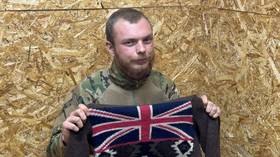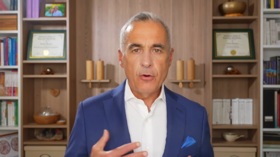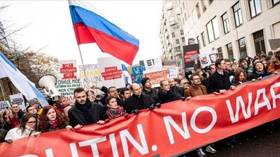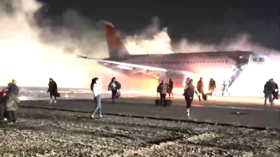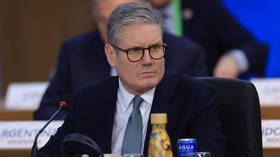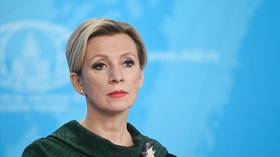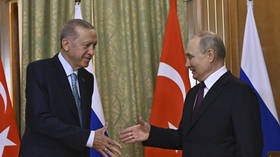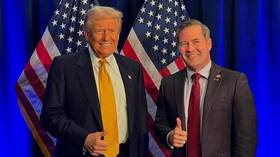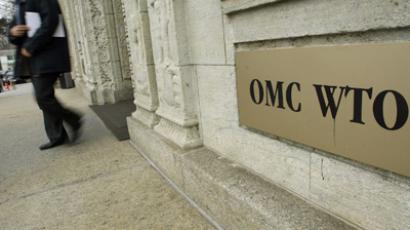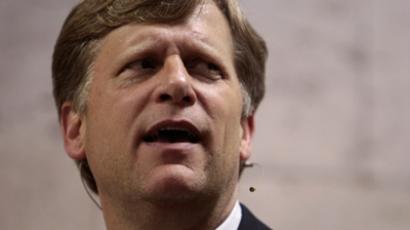‘US, Russia like family members: They love and scrap’
Despite sharp differences on a lot of international issues, including the Syrian conflict and the European missile defense shield, a former US Senator is convinced the two countries cannot exist without each other.
Russia’s and America’s leaders are set to meet for the first time since President Putin was returned to office. The two are scheduled to talk at the G20 Summit in Mexico on Monday. Amid speculation as to what will top the agenda of the highly-anticipated meeting, former US Senator Chris Dodd (D-CT) talked to RT about his vision of mutual relationship.RT: You regularly meet with Russian leaders. What do you think, what’s your perception about what will change in Russia-US relationship with Putin back in office?Chris Dodd: It is changing and all for the better. And there always going to be patches. I have a head of grey hair – my very first trip to Russia was in 1975 and then I had a head of black hair. I was a freshman 30-year-old Congressman. It is a very different place now and a very exciting place to be. I am very high and optimistic on the relationship. I have often felt that Americans and Russians are actually almost related. I think we are more comfortable with each other than we are with almost any other people on the globe. RT:Yes, there is a theory that US and Russia can’t live without each other.CD: It is like a family member – we go through these patches – and this is like family members they love each other one minute and they will be scrapping with each other the next. But I think we are more comfortable with each other than we are with anybody else in many ways.So I am very optimistic about the relationship.RT: But who do you think has the better chances of sealing the deal with Putin – Romney or Obama?CD: That’s an impossible question to answer. My view would be that both of them would understand how valuable this relationship is. How important it is. This relationship is far too important. Russia plays too important role today. And will continue to do so. And want to maintain that relationship whether we are talking about Syria or Iran or the European Union’s economic problems. In every single instance Russia is an important player. And we need to maintain that relationship.RT: Regardless of the fact that we have dear feelings towards each other, facts are stubborn: Russia and the US can’t really find compromise and common ground on key security issues. You just mentioned Syria, and the European missile defense of course is a very sour point. What does it take to break the ice – leadership change, common threat?CD: Common threats can help, common economic interests…I wish there could be a lot more cooperation on Syria at this particular moment. But I think I understand Russia’s perspective, not that I agree with it necessarily, but I think I understand it. But that situation, as troublesome as it is, ought not to sort of derail much larger set of issues dealing with global security issues, global economic issues which must transcend even if there issues as important as Syria. RT: Now that Russia and China have blocked US-sponsored UN security resolution which could entail a possible foreign invasion of Syria, is that what is keeping US from invading the country or there are other reasons?CD: That is the major one. I think we are uneasy about who you are arming, who is the other side. You may wish that there be an opportunity for more openness in Syria, but who really is this “other side”? Where are you getting with all of this? What does it mean at the end? Do these people necessarily want running the country or is it just one faction versus another fighting to gain political control and you may not come up with a better result. It is complicated. The tendency in the news media is to say – these are good guys and these are the bad guys. I am not sure it is quite that simple despite the temptation to draw those conclusions. RT: But could US really sustain another war at this point?CD: It is another matter. There are our own personal reasons. President Obama is correct in this regard: despite the pressure from some American congressmen for arming the opposition in Syria, I think we are exhausted. This has been a very lengthy decade, more than a decade – a decade-and-a-half. And frankly as we are pulling back now out of Afghanistan, we are done in Iraq except for the troops there remaining for the reasons you know, I think the American public right now would like to pull back and not be as engaged as we have been in these places and to get engaged again who knows for how long and how deeply you be involved – I think there are reasons for us to want stay out of it. RT: Why do you think wars have become so inherent to US foreign policy? When you look at it each new president goes to a new war?CD: I don’t think that a lot of this is inherited in some way. The Arab Spring was not orchestrated by the US. This was obviously a groundswell that has been occurring in that part of the world. To assume somehow we orchestrated all of this – nothing can be further from the truth. What was happening in those squares in Cairo were the homegrown people who wanted to express themselves, wanted the basic freedoms that any human being would want regardless the part of the world. And trying to understand that and help provide support where you could without crossing lines is a natural phenomenon and I think we are probably correct in being supportive of those voices seeking for greater freedoms and greater opportunities for themselves. The distinction between doing that and actually becoming engaged in it as we were in Libya, for example, in the ouster of Gaddafi, is a delicate point which you cross over and you become more mashed in the conflict. And I think President Obama rightly is cautious about us becoming too quickly involved by supplying arms to one side or the other or becoming engaged directly ourselves in all of this. Despite our willingness to be supportive.


